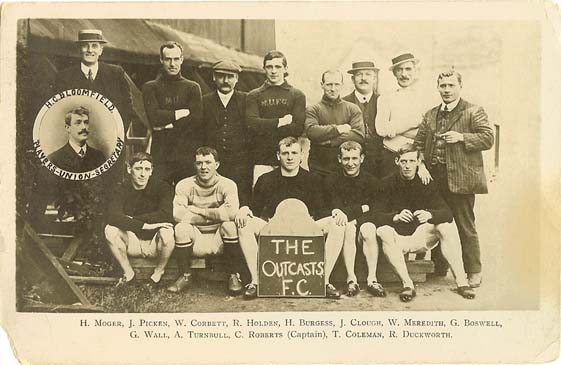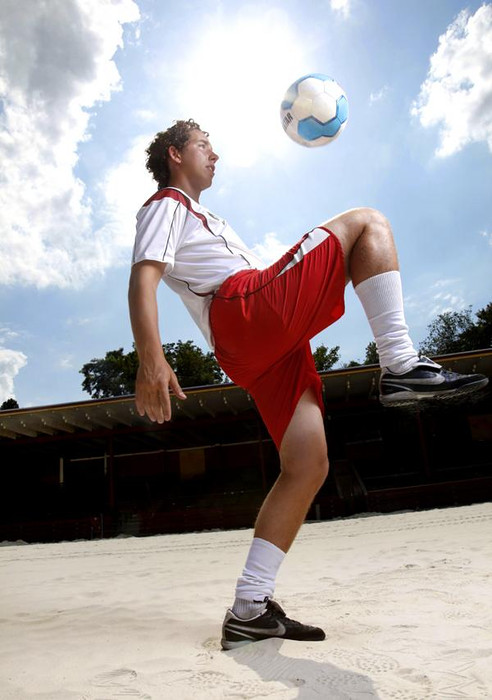|
Mike Trusson
Michael Sydney Trusson (born 26 May 1959) is an English former professional footballer. He made over 400 appearances in a fifteen-year professional career, and later worked in sports marketing and as a scout. Football career Born in Northolt London, Trusson had trials with Chelsea as a schoolboy but was not signed by the club. After relocating to Somerset, he was spotted playing local amateur football by Plymouth Argyle, then of the Football League Second Division, and began his professional career for the club in the 1976–77 season. In his first season with the club, Argyle were relegated to the Third Division, but he remained with the club until 1980, making over 80 appearances in total. In 1980, he was transferred to another Third Division club, Sheffield United, but again saw his team relegated in his first season, as the "Blades" dropped into the Fourth Division. In the 1981–82 season Trusson missed only two of United's 46 league games and scored 11 goals to hel ... [...More Info...] [...Related Items...] OR: [Wikipedia] [Google] [Baidu] |
Midfielder
A midfielder is an outfield position in association football. Midfielders may play an exclusively defensive role, breaking up attacks, and are in that case known as defensive midfielders. As central midfielders often go across boundaries, with mobility and passing ability, they are often referred to as deep-lying midfielders, play-makers, box-to-box midfielders, or holding midfielders. There are also attacking midfielders with limited defensive assignments. The size of midfield units on a team and their assigned roles depend on what formation is used; the unit of these players on the pitch is commonly referred to as the midfield. Its name derives from the fact that midfield units typically make up the in-between units to the defensive units and forward units of a formation. Managers frequently assign one or more midfielders to disrupt the opposing team's attacks, while others may be tasked with creating goals, or have equal responsibilities between attack and defence. M ... [...More Info...] [...Related Items...] OR: [Wikipedia] [Google] [Baidu] |
Professional Footballers' Association
The Professional Footballers' Association (PFA) is the trade union for professional association footballers in England and Wales. Founded in 1907, it is the world's oldest professional sport trade union, and has over 5,000 members. The aims of the PFA are to protect, improve and negotiate the conditions, rights and status of all professional players by collective bargaining agreements. The PFA is affiliated with the Professional Footballers' Association Scotland. The Northern Ireland PFA disbanded in 1995. Following internal and external criticism, the PFA committed to reform and modernise, adopting new governance rules in 2020 and a new chief executive in 2021, but later that year sparked protest when it decided not to publish an independent review. History The Players' Union The PFA was formed on 2 December 1907 as the Association Football Players' and Trainers' Union (AFPTU; commonly referred to at the time as the Players' Union). On that date, Charlie Roberts and Billy ... [...More Info...] [...Related Items...] OR: [Wikipedia] [Google] [Baidu] |
London
London is the capital and largest city of England and the United Kingdom, with a population of just under 9 million. It stands on the River Thames in south-east England at the head of a estuary down to the North Sea, and has been a major settlement for two millennia. The City of London, its ancient core and financial centre, was founded by the Romans as '' Londinium'' and retains its medieval boundaries.See also: Independent city § National capitals The City of Westminster, to the west of the City of London, has for centuries hosted the national government and parliament. Since the 19th century, the name "London" has also referred to the metropolis around this core, historically split between the counties of Middlesex, Essex, Surrey, Kent, and Hertfordshire, which largely comprises Greater London, governed by the Greater London Authority.The Greater London Authority consists of the Mayor of London and the London Assembly. The London Mayor is distinguished fr ... [...More Info...] [...Related Items...] OR: [Wikipedia] [Google] [Baidu] |
Southern Football League
The Southern League is a men's football competition featuring semi-professional clubs from the South and Midlands of England. Together with the Isthmian League and the Northern Premier League it forms levels seven and eight of the English football league system. The structure of the Southern League has changed several times since its formation in 1894, and currently there are 84 clubs which are divided into four divisions. The Central and South Divisions are at step 3 of the National League System (NLS), and are feeder divisions, mainly to the National League South but also to the National League North. Feeding the Premier Divisions are two regional divisions, Division One Central and Division One South, which are at step 4 of the NLS. These divisions are in turn fed by various regional leagues. The league has its administrative head office at Eastgate House in the City of Gloucester. History Football in the south of England Professional football (and, indeed, profession ... [...More Info...] [...Related Items...] OR: [Wikipedia] [Google] [Baidu] |
English Football League System
The English football league system, also known as the football pyramid, is a series of interconnected leagues for men's association football clubs in England, with five teams from Wales, one from Guernsey, one from Jersey and one from the Isle of Man also competing. The system has a hierarchical format with promotion and relegation between leagues at different levels, allowing even the smallest club the theoretical possibility of ultimately rising to the very top of the system, the Premier League. Below that are levels 2–4 organised by the English Football League, then the National League System from levels 5–10 administered by the FA, and thereafter feeder leagues run by relevant county FAs on an ''ad hoc'' basis. The exact number of clubs varies from year to year as clubs join and leave leagues, merge, or fold altogether, but an estimated average of 15 clubs per division implies that more than 7,000 teams of nearly 5,300 clubs are members of a league in the English men ... [...More Info...] [...Related Items...] OR: [Wikipedia] [Google] [Baidu] |
Sussex
Sussex (), from the Old English (), is a historic county in South East England that was formerly an independent medieval Anglo-Saxon kingdom. It is bounded to the west by Hampshire, north by Surrey, northeast by Kent, south by the English Channel, and divided for many purposes into the ceremonial counties of West Sussex and East Sussex. Brighton and Hove, though part of East Sussex, was made a unitary authority in 1997, and as such, is administered independently of the rest of East Sussex. Brighton and Hove was granted city status in 2000. Until then, Chichester was Sussex's only city. The Brighton and Hove built-up area is the 15th largest conurbation in the UK and Brighton and Hove is the most populous city or town in Sussex. Crawley, Worthing and Eastbourne are major towns, each with a population over 100,000. Sussex has three main geographic sub-regions, each oriented approximately east to west. In the southwest is the fertile and densely populated coastal plain. Nort ... [...More Info...] [...Related Items...] OR: [Wikipedia] [Google] [Baidu] |
Non-league Football
Non-League football describes football leagues played outside the top leagues of a country. Usually, it describes leagues which are not fully professional. The term is primarily used for football in England, where it is specifically used to describe all football played at levels below those of the Premier League (20 clubs) and the three divisions of the English Football League (EFL; 72 clubs). Currently, a non-League team would be any club playing in the National League or below that level. Typically, non-League clubs are either semi-professional or amateur in status, although the majority of clubs in the National League are fully professional, some of which are former EFL clubs who have suffered relegation. The term ''non-League'' was commonly used in England long before the creation of the Premier League in 1992, prior to which the top football clubs in England all belonged to The Football League (from 2016, the EFL); at this time, the Football League was commonly referred t ... [...More Info...] [...Related Items...] OR: [Wikipedia] [Google] [Baidu] |
Dean Court
Dean Court, currently known as the Vitality Stadium for sponsorship purposes, is a football stadium in Kings Park, Boscombe, a suburb of Bournemouth, Dorset, England and the home ground of AFC Bournemouth. History In 1910, Boscombe F.C. was given a piece of land by the town's Cooper-Dean family, after whom the ground was named. The land was the site of an old gravel pit, and the ground was not built in time for the start of the 1910–11 season. As a result, the club played at the adjacent King's Park until moving into Dean Court in December 1910. However, the club facilities were still not ready, and players initially had to change in a nearby hotel. Early developments at the ground included a 300-seat stand.Paul Smith & Shirley Smith (2005) ''The Ultimate Directory of English & Scottish Football League Grounds Second Edition 1888–2005'', Yore Publications, p41, In 1923, the club were elected to Division Three South of the Football League, at which point they changed their ... [...More Info...] [...Related Items...] OR: [Wikipedia] [Google] [Baidu] |
First Team (association Football)
Association football (more commonly known as football) was first codified in 1863 in England, although games that involved the kicking of a ball were evident considerably earlier."History of the FA" . Archived fro the original on 7 April 2005. Retrieved 9 October 2007. A large number of football-related terms have since emerged to describe various aspects of the sport and its culture. The evolution of the sport has been mirrored ... [...More Info...] [...Related Items...] OR: [Wikipedia] [Google] [Baidu] |
Youth Team
In sporting terminology, a youth system (or youth academy) is a youth investment program within a particular team or league, which develops and nurtures young talent in farm teams, with the vision of using them in the first team in the future if they show enough promise and potential, and to fill up squad numbers in some teams with small budgets. In contrast to most professional sports in the United States where the high school and collegiate system is responsible for developing young sports people, most football and basketball clubs, especially in Europe and Latin America, take responsibility for developing their own players of the future. Youth academies Youth systems attached exclusively to one club are often called youth academies. In a youth academy, a club will sign multiple players at a very young age and teach them football skills required to play at that club's level and style of football. Clubs are often restricted to recruiting locally based youngsters, but some larger c ... [...More Info...] [...Related Items...] OR: [Wikipedia] [Google] [Baidu] |
Tony Pulis
Anthony Richard Pulis (; born 16 January 1958) is a Welsh football manager and former footballer who last managed Sheffield Wednesday. Pulis obtained his FA coaching badge at age 19, followed by his UEFA 'A' licence aged 21 – making him one of the youngest professional players ever to have obtained the qualification. His son, Anthony, was a professional footballer and played at Stoke. Pulis had a 17-year career as a defender where he played for Bristol Rovers, Newport County, AFC Bournemouth and Gillingham. He also had a short spell in Hong Kong with Happy Valley. Pulis took his first steps into management at Bournemouth, where he was a player/coach and then Harry Redknapp's assistant. He then took control when Redknapp left the club. He then went on to Gillingham before leaving in 1999 after a dispute with chairman Paul Scally. Pulis then had unsuccessful spells at Bristol City and Portsmouth before being appointed manager of Stoke City in 2002. He guided Stoke through ... [...More Info...] [...Related Items...] OR: [Wikipedia] [Google] [Baidu] |


